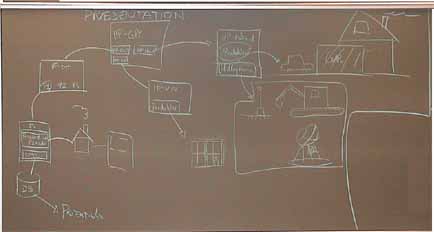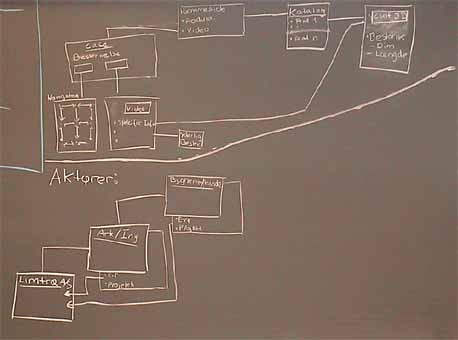|
|
IT i Civilingeniørspeciale i Byggeledelse/IT in Building Management.
Mini-project/Exercises.
During the course a miniproject, COMKIT, will be carried through in the student groups. A WWW-based prototype system COMKIT, that will support system collaboration and knowledge management within a company with distributed offices will be designed and built. (Collaboration and Knowledge Management Support with ICT, COMKIT).
The system shall
- provide an interactive map over system tools/ artefacts (properties, context where they can be used)
- support personal communication and use of shared workspaces
The following domains will be covered during the miniproject
- contextual design methodology
- human computer interaction, HCI, and user interface design
- usability testing
- knowledge management fundamentals
- distributed collaborative work spaces
The system shall be available from the WWW and
The following ICT, Information and Communication Tools, shall be covered during prototype design and development
- 3DStudio Viz to produce an interactive WWW-accessible VRML model
- 3DStudio Max and 3dCult to produce an interactive 3dCult model
- Macromedia Director 8
- QuckTime VR interactive image software
- Adobe Premier to produce web accessible streaming video
- Adobe Photoshop for image editing
- Adobe Acrobat Distiller and Exchange to produce interactive PDF documents
- Netmeeting to establish shared workspaces
Mini-project discussions.
1. Project specification
Discuss within the group possible Multimedia/IT-tools applications
based on the 'Knowledge Management' lecture.
Sketch different applications and their functionality.
2. Collaboratio tools
Install and use collaborative tools (Netmeeting and Groove) over WWW for application sharing, sketching, remote computer control, treaded deiscussions, video/sound communication, shared information containers and
file transfer.
3. Conceptual modelling of COMKIT
Start to design COMKIT.
- Draw rich pictures of COMKIT
- Draw simplified work flow models showing users/roles and in the proposed environment
- Write a few lines describing the Goals with COMKIT
- Describe the focus system user groups
- Describe exisiting information containers and extra needed/proposed information and data for COMKIT (part of an Artifact model)
- Create scenarios (<= four) that forms the rooms for stories about (how to use, understand, discover, appreciate) the system e.g. a roadmap (usage, resources,...), a shop with resources, a theatre (with show cases).
- Try to keep the sceanarios together with a theme like 'discover a new world of collaboration', 'extended forms for knowledge communication ', etc.
- Sketch an activity plan for design and data collection/editing and storage.
4. Graphic tools
- Choose the most relevant version of the picture at
http://www.civil.auc.dk/~i6ks/grafik/
to work on.
Copy a part of the image (roughly 2/3 of the image) for continued editing.
- Imaging that the choosen part are going to be used in a printed
publication. The final print of the image shall have width equal to 6 cm and resolution
170 dpi. Make a TIFF-file that fulfills these requirements.
How big is the file?
How big will the file be if 300 dpi resolution is required?
- The same part of the image will now be used for web publishing. The image shall have width 5 cm on your screen. How many pixels will that correspond to measured along the image width?
Make files in TIF, JPG and GIF formats that fulfils these requirements.
Which are to pros and cons for the different formats ?
- Palce a text and arrow in one image pointing at something you want
to highlite.
- Elaborate one of the images with Adobe Photoshop's filter and transformation tools. Also use a layer to place and adjust a part of another image
on the work image.
5. WEB 3D
Use the course site to download the Cult3D drawer.3ds file. Program
the left door to open and close as you click on it.
6. Digital Video
Plan your video recordings carefully on a story board to minimise recording time.
Capture and edit the digital video in the Media Lab.
7. Usability evaluation
Plan a cooperatative and/or heuristic evaluation of your COMKIT system.
DISCUSSIONS
Group 2.124 "The HP project"
The mini-project will be linked to the group's main project (Project Web database and project management)
The mini-project aim is to develop a Public Relation Portal/Node, PUPN, for the HP company. The PUPN is intended to
be used by
- the public
- authorities
- potential customers
- communities/clients and local partners (project leaders, construction heads, sub-contractrors)
- craftsmen
The main goal with PUPN is
- to advertice the HP company
- to show the world that HP is up-to-date/in-front using IT
- to provide general and some detailed company information (focus on 'construction' department besides 'window' and 'rental/service')
The main information content of PUPP could be
- general information about company structure and activities
- status information about big projetcs where the company is involved (Struer example was mentioned)
- example on catalogue information
The focus in this project is not on detailed solutions for underlying structures but the user interface
- content/data - (interactive) images, videos, interactive 3D models, text, sound, ....
- presentation layout - style, basic structure, philosophy for how the mesages are
conveyed/the story told, multimodal properties (parallel video and text, ...), relation between general
and project specific information,...
- navigation and interaction facilities - maps, clickable images, detours for deepened information,...
- usage contexts - browse solutions, get detailed information, possible links to project and client webs,...
- feed back and inquiry facilities

(Click on image to enlarge)
Group 2.126 "The LimtrÊ project"
The aim is to develop a Product Presentation Portal/Node, PPP, for the LimtrÊ company. The PPP is intended to be used
by
- potential building clients
- engineers/architects in projects
- by the LimtrÊ company itself
The main goal with PPP is
- to give inspiration and ideas for building solutions
- to advertise and present the LimtrÊ company services
- to establish a feed-back channel from (potential) customers
The main information content of PPP could be
- information about products and their properties
- information about solutions where company products have been used
The focus in this project is not on detailed solutions for underlying structures but the user interface
- content/data - (interactive) images, videos, interactive 3D models, text, sound, ....
- presentation layout - style, basic structure, philosophy for how the mesages are
conveyed/the story told, multimodal properties (parallel video and text, ...), relation between general
and project specific information,...
- navigation and interaction facilities - maps, clickable images, detours for deepened information,...
- usage contexts - browse solutions, get detailed information, possible links to project and client webs,...
- feed back and inquiry facilities

(Click on image to enlarge)
|
|




